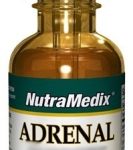Yes, it’s true; at some point in your life it’s highly likely you’ll suffer from adrenal fatigue, but there are things you can do to either prevent it, help you get over it quickly or reduce the symptoms when you realise you’re suffering from it.
Indeed, the Internet is awash with the statistic that around eight in every 10 people across the industrialised world will get adrenal fatigue at some time or another in their lives. Whether that’s true or not, it appears the chances are very high you’ll experience it. Not least because, according to a leading expert on the condition, it’s the very lifestyles we lead that effectively bring it on – poor diet and chronic stress, which affect the body’s efficacy to recover from mental, emotional or physical stress and help give rise to the ailment1.
But what are the symptoms of this short-term or, worse, chronic condition? Well, if you find yourself experiencing a number of these adrenal fatigue symptoms at the same time, you know what you may be suffering from – bone loss; depression; difficulty sleeping/ waking up; fatigue; increased allergic reactions; inflammation; loss of hair; muscle tension/ weakness; poor focus; reduced libido; sugar cravings and weight gain.
Function of the adrenal glands
So much for the symptoms, but why do they occur? What actually are the adrenal glands – why are they so important that, when things aren’t as they should be, these symptoms can occur? Let’s take the latter question first. They’re a pair of glands, each no bigger than the size of an adult’s thumb and each of which can be found sitting above a kidney – and they’re a crucial part of the endocrine system, itself responsible for the creation, distribution and management of all-important hormones in the body. Indeed, the adrenal (or suprarenal) glands produce no less than 50 of these hormones, which are involved in the running of practically every critical bodily function2.
As such then, the adrenals play an essential role in stress response and, in more specific terms, are accountable for the body’s ‘balancing hormones’, such as glucocorticoids (which control blood sugar and manage your immune response), mineralocorticoids (which control blood pressure and more), sex hormones (oestrogen and testosterone) and adrenaline2.
Adrenal fatigue causes
And now to address the second question. Experts believe, as touched on above, that adrenal fatigue – effectively the two glands becoming overloaded and thus operating ineffectively – comes about because a person experiences acute or prolonged stress. In particular, catalysts could be stress encountered due to emotional trauma, divorce, death of a close relative, financial or work troubles or medical surgery2. Moreover, too little exercise, bad sleep and poor diet could be contributory factors – as might even be environmental pollutants and toxins2. Note: adrenal fatigue symptoms may crossover with those of adrenal insufficiency (or Addison’s disease), but – it should be noted – this is a separate condition, which arises from different causes and thus has to be treated differently3.
Fighting adrenal fatigue
So, armed with the knowledge of the all-important adrenals and the condition that occurs when they’re overburdened, what can you do to combat it? Well, broadly speaking, your options fall into three categories. To effectively overcome adrenal fatigue, you’re advised to address all three.
1. De-stress
Pay heed to your mental and emotional wellbeing. Needless to say, this is important for your all-round health; if you’re not looking after yourself by not getting enough rest – and exercise – you’ll likely develop more health conditions than just adrenal fatigue! Some of the following advice may sound obvious, but it’s as well to consider it all – it’s easy to overlook much of it due to the busy, modern lives so many of us lead:
- Get a decent night’s sleep – seven or more hours are needed by most people
- Establish a regular sleep pattern – try not to stay up too late
- Make time for ‘you time’ every day or so – what do you enjoy doing?
- Try to reduce work/ relationship stress
- Eat regular meals – three times daily if possible
- Exercise – even lightly and moderately, but try to get your heart going
- If you’re suffering from trauma or depression, seek help.
2. Improve your diet
Diet’s always a big deal when recovering from adrenal fatigue – the trick is to eradicate the foods and drinks that hinder adrenal function and replace them with those that support it. So, you should aim to remove:
- Caffeine – it may interfere with regular sleep cycles you’re trying to establish
- Sugar – artificial sweeteners, high-sugar foods, sugary drinks and sweets
- Processed food
- Vegetable oils – canola, corn oil and soybean may cause adrenal inflammation.
And replace them with nutrient-rich, low-sugar foods with healthy fat and fibre – they’re great for adrenal health – such as avocado, broccoli, Brussels sprouts, cauliflower, coconut, fatty fish, kelp, olives, seaweed and nuts and seeds (almonds and walnuts and pumpkin, chia and flax seeds).
3. Adrenal fatigue supplements
When it comes to consuming nutrients to treat a condition, practically any health professional is likely to suggest someone should focus on establishing a good, balanced, healthy diet first – before they think about supplementation. Yet, it maybe ought to be mentioned that soil depletion over the last few decades means that, in terms of their genuine nutritional value, not all fruits and vegetables are the same. In which case, you’re highly advised to look to one or two naturally-derived supplements to provide you with the vitamins and minerals you need to give your adrenals a boost and get them back up and functioning as they should. The following – among many more ‘Adrenal Support’ supplements – are available via The Finchley Clinic:
Adrenal Support – a blend of five adaptogenic plant extracts (schisandra, astragalus, snow rose, ginseng and rhodiola) to help maintain healthy adrenal function.
NADH – the abbreviation of nicotinamide adenine dinucleotide hydride, also known as Coenzyme 1; it’s a versatile, important nutrient that supports and promotes adrenal health, anti-ageing, heart, immune and memory health and mood support.
Drive! – comprising the protein-synthesising amino acid tyrosine, this supplement supports the adrenal and thyroid glands and promotes energy, balanced brain chemistry and mental health.
References:
1.Wilson J. L. ‘What is Adrenal Fatigue?’. http://adrenalfatigue.org/what-is-adrenal-fatigue/. AdrenalFatigue.org.
2. ‘3 Steps To Heal Adrenal Fatigue’. https://draxe.com/3-steps-to-heal-adrenal-fatigue. DrAxe.com.
3. ‘Addison’s Disease’. http://www.nhs.uk/Conditions/Addisons-disease/Pages/Introduction.aspx .NHS Choices. Last reviewed: July 2017.



